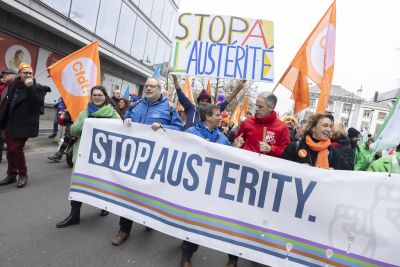The European Commission has published details of the positive impact of public investment - on the same day that the Council is to sign-off on austerity rules which would severely reduce future public investment.
In a mid-point evaluation of its Recovery and Resilience Facility (RRF), the Commission said the €225 billion investment made so far has:
- Ensured “Economic activity bounced back to pre-pandemic levels and unemployment declined to record-low levels”
- “The potential to increase EU real GDP by up to 1.4% in 2026, compared to a situation without Next Generation EU”
- Been a “considerable boost for the green transition”, by helping to “save energy, speed up the production of clean energy and diversify the EU's energy supplies.”
The positive assessment of public investment was published just hours before a Coreper meeting in which member states are set to approve new economic governance measures that could force them to collectively cut their budgets by more than 100 billion Euros next year.
That would mean just four member states would be able to make the investments needed to meet the EU’s climate commitment, according to research by the New Economics Foundation.
The ETUC has raised concerns about adopting economic governance rules that risk to compress investments and social expenditure in a new round of austerity.
The European Trade Union Confederation (ETUC) is calling for the EU to limit the impact of any austerity measures by putting in place a permanent investment mechanism to succeed the RFF.
ETUC General Secretary Esther Lynch said:
“The Commission’s own assessment of the positive impact of public investment shows once again why returning to austerity would be economic self-sabotage."
“Approving the reintroduction of austerity on the same day as this evidence is published shows policy is being made on the basis of political dogma and not what works in practice.
“If member states’ ability to invest is severely reduced, that puts a responsibility on the EU to ensure that public investment needed to achieve green and social targets is still possible through a permanent RFF-style investment instrument.”

